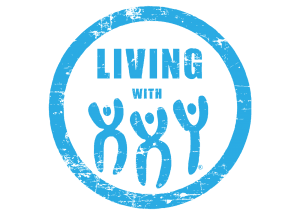English translation from Spanish
I wanted to have an amniocentesis. Although you do it by detecting early any anomaly detectable by this method, you never expect that there will be. In fact, I was also frozen when the gynecologist phoned me to give me the results.
I also got caught working, so after the call, I had trouble concentrating. Because of my academic background, I had studied chromosomal anomalies, so when he told me that the karyotype had left XXY, the first thing I told him was to remind me which syndrome it was. “Klinefelter syndrome,” he told me. Then came my mind the images I had seen of boys and men with gynecomastia (enlarged breasts), wide hips, and smaller genitals. At that moment, I calmed down, thinking that it did not mean anything serious, but I have to confess that I was affected by not having a “normal” child.
When I got home, and my husband saw my face, he assumed that something was not right. When I explained what our child’s karyotype was, what it entailed, and what options there were in these cases, we decided that we would move on, “you’re not going to abort because I’m not blond and blue-eyed,” he told me.
I consulted on the internet because I wanted answers to all the questions he asked me about my son’s future (how his psychomotor, language and school development will be …). A page made by an XXY guy that I found (in the blog, you will find the link) helped me a lot. At that time, it helped me know that being XXY does not mean that all symptoms associated with Klinefelter syndrome will develop and that there is wide variability among XXY individuals. Somehow, my son was not predetermined to be or have certain characteristics.
When we went to the gynecologist’s appointment, he showed his surprise because the same day he called us, we did not go quickly in search of answers and alternatives. Instead, he gave us information about the syndrome, the causes and suggested the options of aborting or moving on “some couples decide to continue, others do not,” I remember telling us. By then, we had it very clear, even if it had hardly been a week.
And now, after 10 years, when I look him in the face, I feel ashamed for having even raised abortion for a second as an option. And when I see his achievements, advances, ability, skills, tenderness, and happiness … I feel very proud of him.
Mum of Aitor
Spanish
Yo quería hacerme la amniocentesis. Aunque te la haces por detectar precozmente cualquier anomalía detectable por este método, nunca te esperas que vaya a haberlas. De hecho, yo también me quedé helada cuando el ginecólogo me llamó por teléfono para darme los resultados.
A mí también me pilló trabajando, por lo que después de la llamada, me costó concentrarme. Por mi formación académica, había estudiado las anomalías cromosómicas, así que cuando me dijo que el cariotipo había salido XXY, lo primero que le dije era que me recordara a qué síndrome correspondía. “Síndrome de Klinefelter”, me dijo. Entonces me vinieron a la cabeza las imágenes que había visto de chicos y hombres con ginecomastia (aumento del tamaño de los pechos), caderas anchas y genitales de menor tamaño. En ese momento me tranquilicé, pensando en que no suponía nada grave, pero he de confesar que me afectó eso de no tener un niño “normal”.
Cuando llegué a casa y mi marido me vio la cara, ya supuso que algo no iba bien. Cuando le expliqué cuál era el cariotipo de nuestro hijo, lo que ello suponía y las opciones que había en estos casos, ya decidimos que íbamos a seguir adelante, “no vas a abortar porque no sea rubio y con ojos azules”, me dijo.
Seguí consultando en internet porque quería respuestas a todas las preguntas que me hacía en cuanto al futuro de mi hijo (cómo será su desarrollo psicomotor, del lenguaje, en el colegio,…). Una página realizada por un chico XXY que encontré (en el blog encontraréis el enlace), me ayudó mucho. En ese momento, me ayudó saber que ser XXY no significa que se vayan a desarrollar todos los síntomas asociados al síndrome de Klinefelter y que existe una amplia variabilidad entre individuos XXY. De alguna manera, mi hijo no estaba predeterminado a ser o tener unas determinadas características.
Cuando acudimos a la cita del ginecólogo, mostró su extrañeza porque el mismo día que nos llamó no acudimos rápidamente en busca de respuestas y alternativas. Nos dio información sobre el síndrome, las causas, y nos planteó las opciones de abortar o seguir adelante “algunas parejas deciden continuar adelante, otras no”, recuerdo que nos dijo. Para entonces lo teníamos muy claro aunque apenas hubiera pasado una semana.
Y ahora, después de 10 años, cuando le miro a la cara, siento vergüenza por haber siquiera planteado por un segundo el aborto como una opción. Y cuando veo sus logros, sus avances, su capacidad, sus habilidades, su ternura, su felicidad,… me siento muy orgullosa de él.
Mamá de Aitor




Leave A Comment